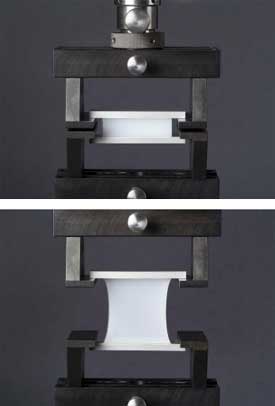Oct 2 2008
To supplement its existing construction sealants range for window construction, door seals and sanitary applications, WACKER has developed three novel silicone sealants: ELASTOSIL® 7000 N, ELASTOSIL® 8000 N and ELASTOSIL® 9000 N. These novel silicone rubber compounds have special properties that meet customer demands for improved curing, cracking resistance and processing times. The sealants also set new standards for safety and tolerance of processing errors.
 A test specimen made of ELASTOSIL® 7000 N at rest (upper image) and during the stress test (lower image). WACKER SILICONES’ novel silicone elastomer can be stretched by 100% and more. (Photos: Wacker Chemie AG)
A test specimen made of ELASTOSIL® 7000 N at rest (upper image) and during the stress test (lower image). WACKER SILICONES’ novel silicone elastomer can be stretched by 100% and more. (Photos: Wacker Chemie AG)
Specialty silanes are the key to this technological innovation and the resultant novel product properties. These are significantly less volatile than the alkoxy-based products used until now. WACKER’s patent-pending process achieves low volatility by using components with higher molecular weights and larger organic groups. As a result, there is also less diffusion of volatile compounds out of the product – a positive feature of the curing process – which results in improved end properties. Furthermore, with this innovation, WACKER SILICONES is taking a first big step toward meeting the high demands of future chemicals legislation.
A special feature of these novel silicone sealants is their improved processability compared to their predecessors. This provides the products with a longer “open” time, which gives processors considerably more leeway. ELASTOSIL® 7000 N, ELASTOSIL® 8000 N and ELASTOSIL® 9000 N also have a higher paste viscosity – a characteristic that greatly simplifies the smoothing process.
Joints that are under severe strain particularly benefit from WACKER’s novel products. Material trials show that the test samples can permanently withstand elongation of well over 100% of the initial joint width without any crack formation. This property is important for large outdoor structural elements, since they are often exposed to considerable temperature fluctuations. It is also significant for indoor applications, as joint dimensions can continue to change after the construction job has been completed, for example due to floor screeds’ settling.
ELASTOSIL® 7000 N, ELASTOSIL® 8000 N and ELASTOSIL® 9000 N can compensate for these movements much more effectively than conventional products. This is because the sealants have a mechanism that distributes any tensile and stretching forces that may arise and reduces them better. This avoids the formation of cracks in the sealant permanently.